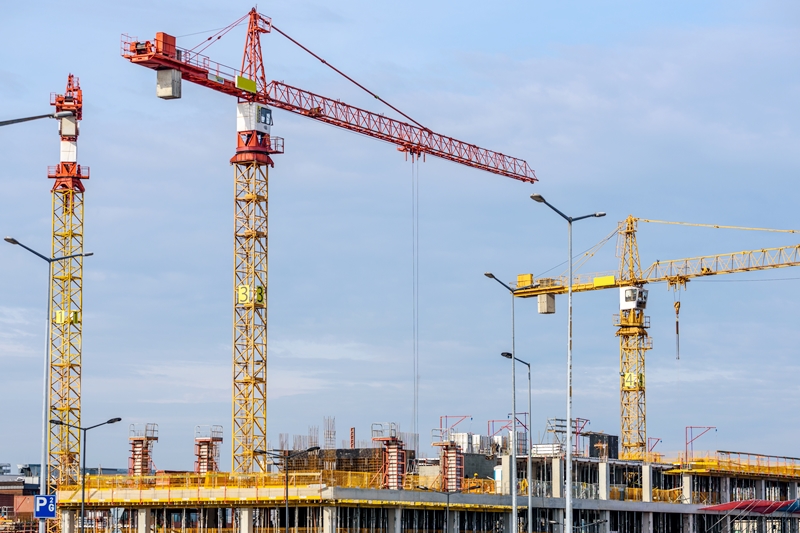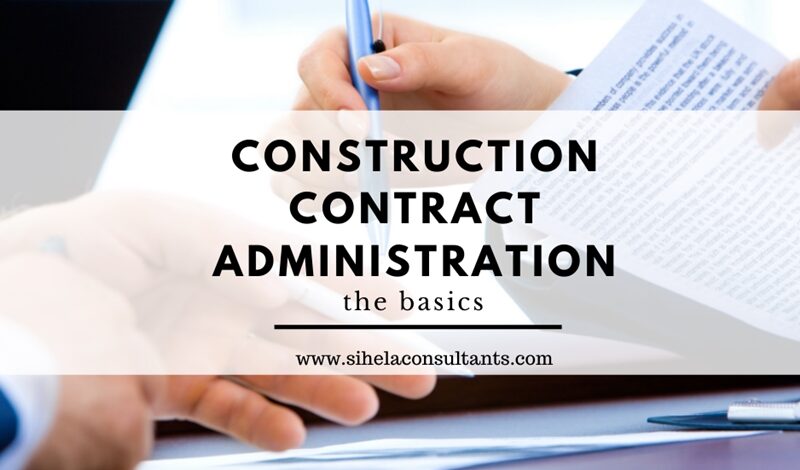Contract administration plays a major role when delivering any construction project. Therefore it is important to have an understanding of the construction contract administration process.
However, with a lot of contractual clauses and conditions of contract documents, sometimes it is not an easy task for a beginner in this field. This is where I want to share this article to help you to understand the basics of construction contract administration.
When you know the basics it is easy to learn more about contract documents in order to sharpen your knowledge.
Construction Contract Administration involves a process of activities that help to manage the design, contract agreement, and construction process of any development project with proper control. While poor contract management leads a project to unnecessary disputes and claims, a proper contract administration would lead any project to end up within the stipulated budget and time frame.
Phases of a Project
Construction projects undergo different stages. It all starts from the concept and then it is developed as a detailed design.
After that, a team of consultants will take necessary actions to develop the design and to seek a suitable contractor to construct the developed design.
After the tendering stage and after awarding the contract to the selected contractor, the construction phase starts.
At the construction stage, there is more risk involved including time and cost management. In case both time and cost are not administered, the project will end up without giving the expected results to the owner.
This is where contract administration is important for any construction project’s success.
Though it is not easy to describe the whole process involved in Contract Administration in a short article, here I discuss the important stages and important terms related to construction projects and Contract administration.

What does it mean by Contract Administration in Construction projects?
Contract Administration involves all necessary activities for a construction project performance from the initial stage to its final stage. These activities include monitoring of the project performance with the agreed contractual obligations between the parties to the contract.
What is a Contract?
In simple terms, a contract is a mutual agreement created between two or more parties. The main purpose of a contract is to ensure the parties involving in a contract aware of their obligations and they fulfill the obligations.
Different stages of a Construction Contract
While parties involve in a construction contract include Employer, Employer’s representative, Architect, Engineer, Quantity Surveyor, and contractors it is also important for these parties to fulfill their obligations to deliver a successful project completion.
Typically, a construction project undergoes few different stages.
- Design Stage
- Tender Stage
- Construction stage
- Handover and Final Account stage
In all these stages of any construction project, Contract Administration plays a major role in contract monitoring and risk controlling.
When does Contract Administration process begin?
The contract administration process begins together with the project design and planning stage. During this stage, it is necessary to determine the contracting system to follow for the specific project. Mainly this can be two types.
- Design then Build
- Design and Build (Turnkey projects)
In the planning stage of any development project, it is necessary to appoint the contract administrator.
For the sake of describing the whole Contract Administration process as a brief, here I chose the Design then Build Contract system with different stages of it. However, depending on the contracting system, the process can be slightly different.
Design stage Contract Administration
In this stage, the employer is with his conceptual plan in mind. In most of the projects, a project manager will be appointed at this stage. Contract Administration duties during this stage include monitoring and controlling both cost and time under the pre-determined terms with the Employer.
As the next step in the design stage, it is necessary to present the design brief by the Employer’s Project Manager. This stage also includes the necessary authority requirements and approval to develop the initial concept. Usually, the design brief includes the details related to the development such as land use, compliance required by authorities, functional requirements, allocated budget, and suggested development period.
Once the design brief is presented, the design team will prepare the final design including the drawings.
Once the design drawings are available, the next step is to prepare the specifications and contract documents. Usually, the Contract Administrator for the project will prepare the contract documents.
At this stage, contract documents will be prepared and contractual matters will be discussed for the proposed project.
During this stage, Risk allocation will be discussed. It is important to determine what risks to pass to the contractor and the risks to be undertaken by the Employer.
In this stage, it is also necessary to determine important factors that are related to managing the construction risks such as Construction Period, Liquidated Damages, Defects Liability Period, Payment terms, and Retention Sum.
Contract Administration during the Tendering Stage
Procurement is an important stage for any project and this is the stage where more contract administration work involves. It is necessary to determine the tender procedure and prepare the tender documents. In most construction projects, tender documents will be part of the contract documents. Therefore it is important to check the tender documents thoroughly before calling for bids.
Once the tender closing date is reached, the next step is tender evaluation. This is another important task involved in the contract administration process of any construction project.
In this stage, the Consultant QS or Contract Administrator has the responsibility of determining evaluation criteria. Tender evaluation criteria can depend on the technical proposal, time, and price. However, there will be a series of tender clarifications in terms of tender questionnaires, tender interviews, and clarifications.
The design team will involve in the tender evaluation process by checking and recommending the construction proposals. Clarifying the tenderer’s doubts and issues at this stage is helpful for avoiding unnecessary variation claims that can arise during the construction stage.
After the evaluation process, the next stage is the Award of Tender.
Letter of Award, Contract Documents, and construction drawings are the important things to prepare during this stage to award the tender and to sign the contract agreement between the parties to the contract.
Contract Administration during Construction Stage
In this stage, it is necessary to understand the contract document and the obligations to each party. During the construction stage, more risk is involved in terms of both time and money. At the same time, it is also necessary to get the work done with the required quality and as mentioned in the specifications.
Contract Administration during the construction stage involves progress claims, variations to the contract, claims including Extension of Time, and other legal matters. Usually, the contract administration team is aware of the binding contract and its clauses. Contract Administrators, Quantity Surveyors, and Contract Engineers mainly involve in the process in different roles and responsibilities.
In different countries, different forms of contract are used. In Singapore, the SIA Form of Contract and the PSSCOC are the widely used Form of Contract for both private sector projects and public sector projects. It is important to know the contract document specifically used for the project when you involve in contract administration or related matters of any project.
Construction Contract Administration during Completion and Final Account Stage
Contract Administration during the maintenance, completion and Final account stage is mostly similar in different forms of contract. In this stage, it is necessary to monitor the defects, warranties if necessary, and any other liabilities. Once all the obligations are fulfilled, it is necessary to prepare the Final Account Certificate. Adjustments to the contract document in terms of variations, liquidated damages or penalties should indicate in Final Account. In this stage, the release of retention money is included too.
Although the above-mentioned process is a brief of Contract Administration, it is not such a simple process. It includes more risks and in some cases, there are disputes to solve. Therefore Contract Administrators and Quantity Surveyors play a major role in delivering a project within the stipulated contract obligations.
When does Construction Contract Administration process end?
Usually, the Contract Administration process will end up with the acceptance of the project. This can be done after completion of a project with due performance or termination of a contract due to poor performance by any of the parties to the contract. Don’t forget that after handing over a completed project, there is a defects liability period as well.
Most of the times dispute resolution can be done by negotiating. However, some disputes need arbitration or mediation.
After all, Contract Administration plays an important role in Construction Project Management. Through Contract Administration, project risk is monitored and controlled. Also, a good Contract Administration process is important for successful project delivery.


Simple & covered the key elements . Weldone .